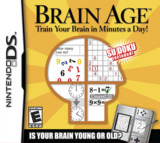Can an educational tool perform well as a game?
The principle of every puzzle that gets thrown at you is exercising the prefrontal cortex, the part of your brain that governs your decision making and it certainly does. Every question feels so obvious but there's some perplexing indecision as you attempt to suss out the answer. Ranging from maths questions as patronisingly basic as "8 + 8" to calculating the number of people in a house after more have entered and exited results in improvement to your ability to gather and manage data received through visual deduction.
Unfortunately, the first fatal flaw is introduced when answering the majority of puzzles which, until you adjust to the calligraphic expectations of Brain Training, creates misunderstanding between you and the hardware. Most puzzles require a written solution and the DS simply can't handle some peoples handwriting, the recognition is really unstable, so it takes a while before you can answer questions confidently.
Furthermore, any recognition feels agonisingly finicky. Voice detection has difficulties deciphering some accents which leeches the fun from shouting colours at your handheld. Diction and perfect written style are relied heavily upon but the recognition feels neglected for such an intrinsic component. Adopting an adaptive attitude towards your handwriting is a pain, especially when you discover you're penalised for making errors so this can be discouraging for people who only just picked up the game.
The game also has an impugning repetitiveness: you're completing the same puzzles every day. New puzzles and difficulty levels are hastily unlocked in an attempt to congeal the reiteration but it only works for a day or two. The array of minigames is severely limited so generates a prosaic challenge and the game will become stale.
My favourite element in the game was the broad range of sudoku puzzles added as an aside to the primary "brain age" test. Spanning about three pages the puzzles present easy, intermediate and hard levels of difficulty and spending time chewing on the stylus in deep contemplation can be outstandingly enjoyable.
In conclusion, Brain Age has its good an bad moments. A glitchy and repetitive system of methodically supercharging your brainpower painfully smudges the gameplay. On the other hand, results do glacially better giving some evidence that this game does work in the way it is intended to. The sudoku offers an enthralling selection games that'll keep you interested long after the actual game has atrophied. If it is available you should get it, it's cheap, it's fun and it enhances your brain's competence.

